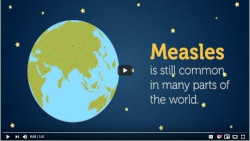
| April 2019 | |||||||||||
| Top stories | |||||||||||
| In the news | |||||||||||
| Photos | |||||||||||
| Contact us | |||||||||||
| Archive | |||||||||||
|
SHL confirms two Iowa cases of measles |
April 22, 2019 --
Two cases of measles in northeast Iowa have been confirmed by testing at SHL within one week. The Iowa Department of Public Health (IDPH) announced on April 15 that an unvaccinated patient was infected by measles. The person had recently returned from Israel where a measles outbreak is occurring.
“This is the first case of measles in Iowa since 2011, and serves as a reminder for all Iowans to ensure their vaccinations are up-to-date,” IDPH said in its announcement. “Vaccines prevent diseases and save lives.”
The second case also is an unvaccinated individual and is a household contact of the first case. IDPH announced on April 19 that the second person was identified as part of the initial case investigation and was under a public health voluntary confinement order in the home to prevent further exposures.
“Because this second measles case has been isolated at home during the measles incubation period, there is no current threat to the general public,” IDPH said. “However, measles is very contagious and cases have unfortunately been increasing across the U.S. and abroad.”
Measles can cause serious health complications. The Centers for Disease Control and Prevention (CDC) reports that about one in four people in the U.S. who get measles will be hospitalized, and one out of 1,000 will develop brain swelling, which could lead to brain damage. One or two out of 1,000 people with measles will die, even with the best of care.
Common symptoms include fever, rash, runny nose and red eyes. Measles is extremely contagious. According to the CDC, if one person has it, nine out of 10 people around him also will become infected if they are not protected. The best protection against measles is the measles-mumps-rubella (MMR) vaccine.
